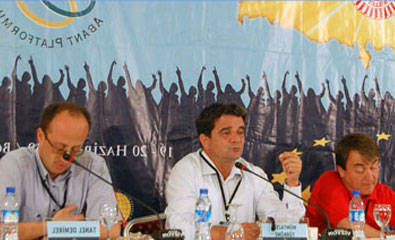Abant Platform and Barriers to Democracy
 It should be the distinctive characteristic of intellectuals to focus on and discuss solutions at a time when everyone else is centered on crises or a lack of settlement.
It should be the distinctive characteristic of intellectuals to focus on and discuss solutions at a time when everyone else is centered on crises or a lack of settlement.
While raising complaints about existing situations and emergent problems is something that everyone can do, engaging in a quest to deal with problems and difficulties entails intellectual gatherings and bold stances and initiatives. Turkey is a country whose problems are unfortunately not few. But luckily, it is also a country where these problems are boldly discussed and solutions for these problems are sought. The Abant Platform serves as one of the venues where such discussions take place.
Launched by the Journalists and Writers Association, the Abant Platform held its 12th meeting in Abant, a town near Bolu, where the first meeting had been held. Titled "Democratization: Political Parties from Sept. 12 [coup] to the European Union," the 12th meeting of the Abant Platform ended this weekend, and people discussed political parties as sine quo non elements of democracies as well as legal and constitutional amendments concerning political parties. As a country that has not been able to ward off military/bureaucratic guardianship, Turkey is a place where political parties are at a disadvantage. It should not be easy to find another country that has closed down 24 political parties by court order, but can still call itself democratic.
As if the military/bureaucratic guardianship (tutelage) that has been dominating the entire political sphere as an evil nightmare were not enough, the Political Parties Law, the Election Law and the bylaws of political parties in Turkey contain numerous antidemocratic elements. Moreover, dominant political player that are under the pressure of antidemocratic powers find it favorable to keep weaker political movements under pressure, and the political party leader may voice demands for a more democratic system for political parties, but they fail to make similar demands for the consolidation of democratic culture within their own parties.
The 10 percent countrywide election threshold, which sacrifices "fairness in representation," an essential ingredient of democracies, with the pretext of "stability in governance," is making the political climate, which is already rife with numerous antidemocratic elements, more intolerable. As underlined by Professor Kemal Karpat of the University of Wisconsin-Madison, a doyen of academicians who delivered a keynote speech that can be regarded a manifesto of democracy at the Abant Platform's meetings, during the last 200 years of Turkish modernization, administrations have always kept the national will under tutelage and turned a blind eye to the traditions, customs and religious beliefs of the nation and have tried to rule the country as they wish. Despite the assertive discourse, democracy has always been under tight control in Turkey, and only during the last 20 or 25 years, the idea of democracy has started to be slowly adopted by the people at large. Thus, Turkey is currently going through a period of transition from controlled democracy to true democracy.
However, according to Karpat, there are various groups who resist this process. These people cannot abandon their old habits, and they cannot come to internalize the idea that every human being is born free, but they continue to assert that the nation needs a shepherd to guide it. Today, a major representative of this attitude is the military. The stance adopted by the military officers who form an elitist group with their education, lifestyles and mentalities cannot be compromised with the idea of democracy. However, the adoption of democracy by the military will strengthen both democracy and the military.
Karpat listed the judiciary as another source of resistance to democracy and underlined that while around the world, judicial bodies are typically concerned with the implementation of laws rather than their making, the same cannot be said of Turkey. Karpat asserted that the judiciary should not make laws, but implement them, adding that the judiciary is also not entitled to change the provisions of existing laws through its interpretation, but there are many cases of this distorted mentality in Turkey.
Karpat further listed the lack of a strong and reliable opposition as another barrier to democratization. "Without opposition, democracy cannot be. Yet, the opposition must always have full faith in all principles of democracy. There must be agreement between the government and opposition about the fundamental qualities of democracy," he said.
A long as there are the above-mentioned barriers, one cannot expect a full-fledged formation of the national will as the basic constituent of the Constitution and democracy. We highly appreciate the traditional efforts by the Abant Platform to discuss the impact of these barriers on Turkish democracy and make concrete proposals about them.
- Created on .